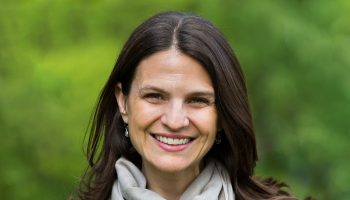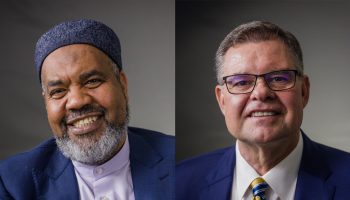On the steps of Smith Memorial Library on the Fourth of July, Rabbi Arthur Waskow read the Declaration of Independence aloud to Chautauquans. On Wednesday, he will ponder what Thomas Jefferson may have written in the modern era.
Waskow will present his ideas at 2 p.m. Wednesday in the Hall of Philosophy as part of the week’s Interfaith Lecture theme, “Celebrating the Genius and Soul of a Nation.” During Waskow’s lecture, titled “The Declaration of Independence: What would Jefferson Write Today?” he will use his doctorate in U.S. history and experience as a spiritual leader to assess what Jefferson would have fought for today.
“I wanted to sort of set up a framework … for how to think about what American government is like in our generation, drawing on Revolutionary ideas and the Declaration of Independence,” Waskow said.
Waskow received his doctorate in 1963 from the University of Wisconsin, where he focused on the pre-Revolutionary and early Federal periods. Afterwards, he became active in the public policy sector, working for Congress and research institutes.
Not only has he worked in government, but he has also struggled for what he believes in, as did the nation’s forefathers. Waskow is the founder and director of The Shalom Center, an organization dedicated to enabling activists and spiritual leaders through Judaism to create a better world. He is also an activist himself, and has been arrested about 23 times during protests.
Waskow said he will use both of these experiences to inform Wednesday’s lecture.
“I didn’t abandon concern for what people usually consider political issues,” Waskow said. “In any case, I became more vigorously involved when I became a rabbi. But I see things a little differently now.”
Based on his studies of Jefferson, though, Waskow said he thinks Jefferson, a slave owner, would be more supportive of human rights and minorities than in the 18th century. Jefferson would also be concerned about corporate influence, which Waskow said most colonists were suspicious of even though they didn’t have as much power at the time.
Jefferson would also be invested in protecting the environment, Waskow said, as he had been a farmer interested in the natural world. Similarly, climate change has been Waskow’s predominate focus in the last few years. He said part of the Declaration’s unalienable rights is the right to a livable planet.
Just like Jefferson wrote the Declaration to the British government, Waskow delivered his message straight to Washington, D.C. On the steps of the U.S. Capitol building after the 2010 BP oil spill, he and a hundred others of various faiths chanted a lament for the Earth.
“That was a renewal of a very ancient tradition to a new situation,” Waskow said.




